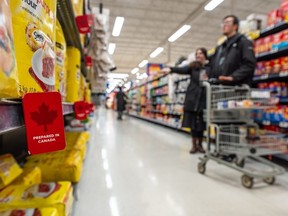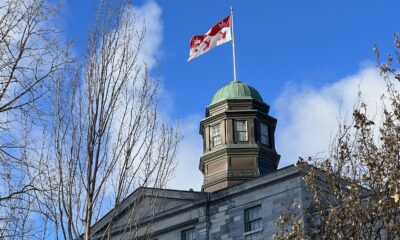Politics
Canada Faces Cost of Living Crisis Despite Drop in Inflation

Canadian families continue to grapple with a rising cost of living, despite a slight decrease in the national inflation rate to 1.7% in July 2025 from 1.9% in June. The decline in inflation is overshadowed by significant increases in food and shelter costs, leaving many households under financial strain.
According to Statistics Canada, the drop in the inflation rate was largely influenced by the removal of the consumer carbon tax by Prime Minister Mark Carney in March, which effectively lowered gasoline prices. The agency reported a 16.1% year-over-year decrease in gasoline prices in July, following a 13.4% decline in June. This reduction significantly helped keep the overall inflation figure down. However, when excluding gasoline from the calculations, the inflation rate actually rose by 2.5% in July, indicating underlying pressures on consumer prices.
Rising Costs of Essentials
The surge in food and shelter costs remains a pressing concern for Canadians. The cost of groceries increased at an annual rate of 3.4% in July, up from 2.8% in June, and is now more than double the headline inflation rate. Families are now paying 27.1% more for groceries compared to July 2020, highlighting the ongoing challenges in affording basic necessities.
In addition to grocery prices, the cost of shelter also saw an uptick, rising by 3% in July compared to the same month last year. This marks an increase from a 2.9% rise in June and represents the first acceleration in shelter prices since February 2024. Rent costs are also increasing, climbing by 5.1% year over year in July, an increase from 4.7% in June.
Mortgage interest costs, while still rising, have shown slower growth, increasing by 4.8% on a year-over-year basis in July, down from 5.6% in June. These costs have been on a downward trajectory since September 2023, but the overall picture remains fraught with challenges for many households.
Government’s Response Needed
The inflation figures reflect a complex interplay of factors, some of which are beyond the federal government’s control. Nevertheless, the data from July underscores the urgent need for the Carney administration to prioritize measures aimed at making life more affordable for Canadians. This necessity becomes even more pressing as Parliament prepares to reconvene in the fall.
While the recent political pressure from Conservative Leader Pierre Poilievre and other members of the opposition led to the elimination of the consumer carbon tax, the rising costs of food and shelter indicate that much more is needed to address the ongoing cost-of-living crisis. As families continue to feel the pinch, government action will be crucial to alleviate the financial burdens faced by many across the nation.
-

 Politics4 weeks ago
Politics4 weeks agoSecwepemc First Nation Seeks Aboriginal Title Over Kamloops Area
-

 World5 months ago
World5 months agoScientists Unearth Ancient Antarctic Ice to Unlock Climate Secrets
-

 Entertainment5 months ago
Entertainment5 months agoTrump and McCormick to Announce $70 Billion Energy Investments
-

 Science5 months ago
Science5 months agoFour Astronauts Return to Earth After International Space Station Mission
-

 Lifestyle5 months ago
Lifestyle5 months agoTransLink Launches Food Truck Program to Boost Revenue in Vancouver
-

 Technology3 months ago
Technology3 months agoApple Notes Enhances Functionality with Markdown Support in macOS 26
-

 Lifestyle3 months ago
Lifestyle3 months agoManitoba’s Burger Champion Shines Again Amid Dining Innovations
-

 Top Stories2 months ago
Top Stories2 months agoUrgent Update: Fatal Crash on Highway 99 Claims Life of Pitt Meadows Man
-

 Politics4 months ago
Politics4 months agoUkrainian Tennis Star Elina Svitolina Faces Death Threats Online
-

 Sports5 months ago
Sports5 months agoSearch Underway for Missing Hunter Amid Hokkaido Bear Emergency
-

 Politics5 months ago
Politics5 months agoCarney Engages First Nations Leaders at Development Law Summit
-

 Technology5 months ago
Technology5 months agoFrosthaven Launches Early Access on July 31, 2025


















